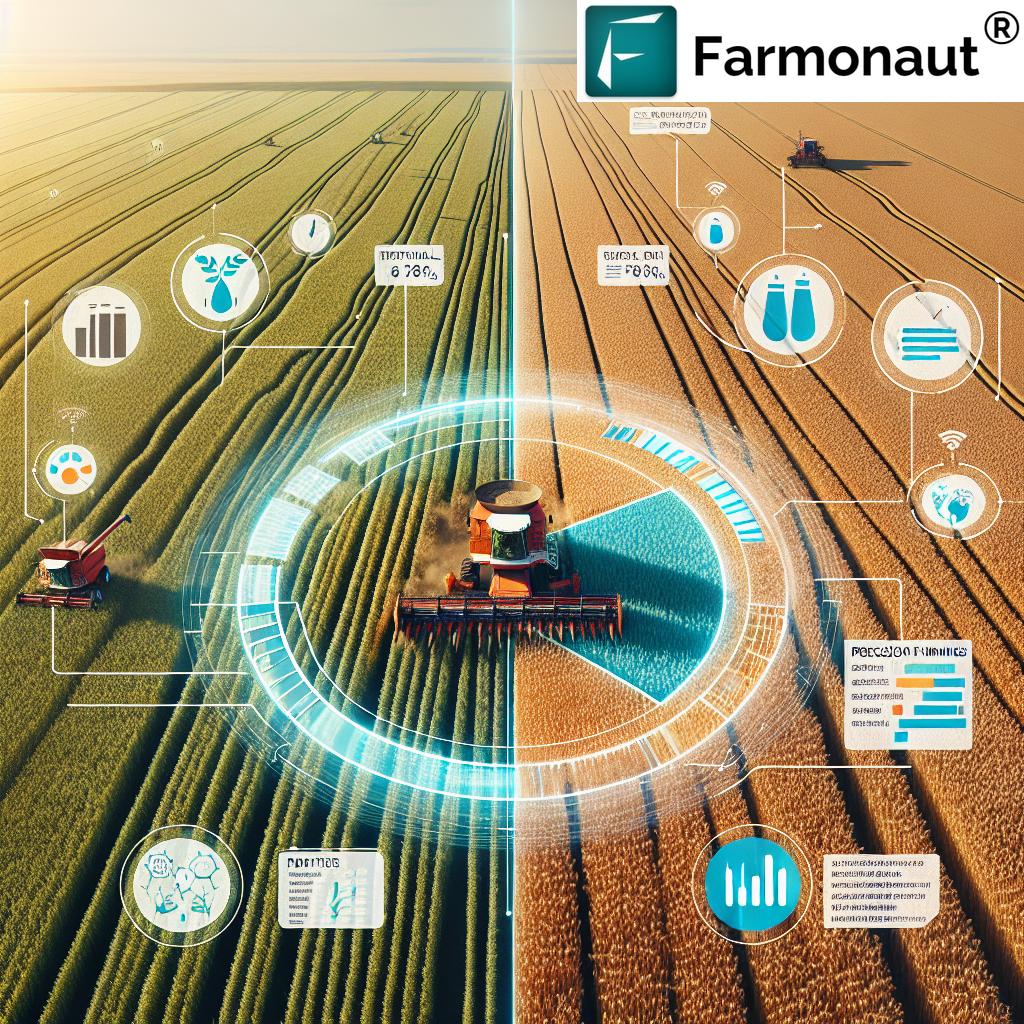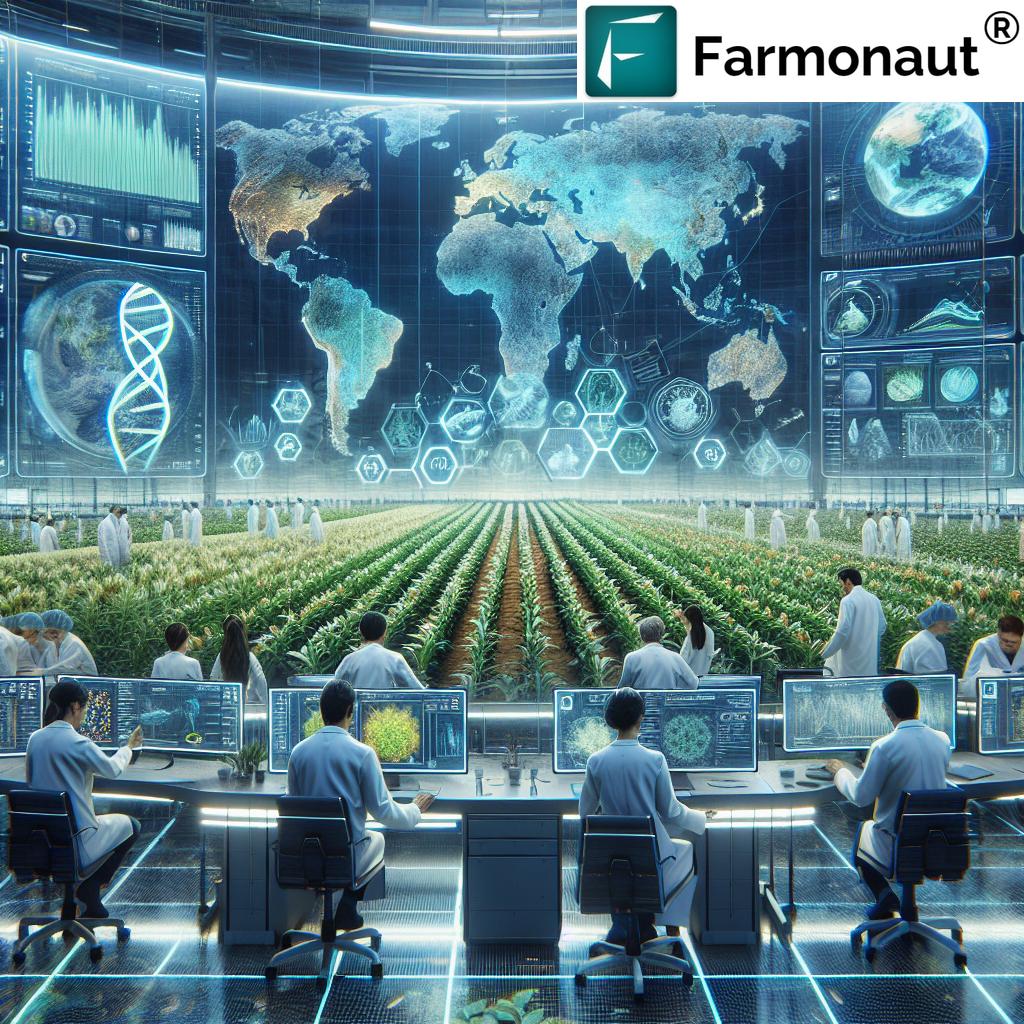GM Crops Revolution: From Skepticism to Science-Backed Solution for Global Food Security
“GM crops have increased crop yields by up to 22% while reducing pesticide use by 37% since their introduction.”
In the face of climate change and a growing global population, the agricultural industry is undergoing a remarkable transformation. We at Farmonaut are at the forefront of this revolution, witnessing firsthand how sustainable agriculture technology and genetically modified (GM) crops are reshaping the landscape of global food production. As we delve into this industry-shaping topic, we’ll explore the scientific consensus on GMOs and their crucial role in addressing food security challenges.

The Evolution of GM Crops: A Scientific Perspective
Genetically modified crops have come a long way since their introduction in the 1990s. Initially met with skepticism and concern, these agricultural innovations have undergone rigorous scientific scrutiny and have emerged as a potential solution to many of the challenges facing global food production.
- Increased crop yields
- Reduced pesticide use
- Enhanced nutritional content
- Improved resistance to pests and diseases
The scientific community has reached a broad consensus on the safety and potential benefits of GM crops. A comprehensive study by the National Academies of Sciences, Engineering, and Medicine found no substantiated evidence of risks to human health from the consumption of genetically engineered crops.
GM Crop Benefits: Addressing Global Food Security
As the global population continues to grow, estimated to reach 9.7 billion by 2050, the need for sustainable and efficient food production has never been more critical. GM crops offer several advantages that directly address food security concerns:
- Increased Yields: GM crops can produce higher yields on existing farmland, reducing the need for agricultural expansion and deforestation.
- Pest and Disease Resistance: Genetically engineered crops can withstand common pests and diseases, reducing crop losses and the need for chemical pesticides.
- Drought Tolerance: Some GM varieties are designed to thrive in water-stressed conditions, crucial for adapting to climate change.
- Nutritional Enhancement: Biofortified GM crops, like Golden Rice, can address nutritional deficiencies in developing countries.
At Farmonaut, we recognize the potential of GM crops in revolutionizing agriculture. Our satellite-based crop health monitoring system helps farmers maximize the benefits of these advanced crop varieties by providing real-time insights into vegetation health, soil moisture levels, and other critical metrics.
Environmental Impact of GM Crops: A Balanced View
The environmental impact of GM crops has been a subject of intense debate. However, recent studies have shown that GM crops can contribute positively to environmental sustainability:
- Reduced pesticide use leads to fewer harmful chemicals in ecosystems
- Increased yields on existing farmland can help preserve natural habitats
- Some GM crops require less water, reducing agricultural water consumption
- Herbicide-tolerant crops allow for no-till farming, reducing soil erosion
Our Jeevn AI Advisory System at Farmonaut integrates these environmental considerations, providing farmers with personalized recommendations that balance productivity with sustainability.
Precision Agriculture Techniques: Enhancing GM Crop Production
The integration of precision agriculture techniques with GM crops represents a powerful combination for modern farming practices. These advanced methods allow farmers to optimize resource use and maximize the potential of genetically engineered crops:
- Satellite imagery for precise crop monitoring
- AI-driven advisory systems for tailored farm management
- Drone technology for targeted application of inputs
- IoT sensors for real-time data collection
Farmonaut’s platform leverages these precision agriculture techniques, providing farmers with valuable tools to make data-driven decisions about their GM crops. Our satellite-based monitoring system, combined with AI analytics, enables farmers to optimize irrigation, fertilizer usage, and pest management strategies.
Explore Farmonaut’s API for advanced agricultural solutions
From Skepticism to Support: Changing Perspectives on GM Crops
One of the most intriguing aspects of the GM crop revolution is the shift in perspective among some former critics. Notable environmentalists and scientists who once opposed genetic modification in agriculture have now become advocates for this technology. This change is largely due to:
- Accumulating scientific evidence supporting GM crop safety
- Recognition of GM crops’ potential in addressing food security
- Improved understanding of genetic engineering techniques
- Realization of GM crops’ role in sustainable agriculture
“Over 70% of scientists agree that GM foods are safe for consumption, according to a comprehensive study by the Pew Research Center.”
This shift in perspective highlights the importance of ongoing research and open dialogue in shaping public opinion and policy regarding GM crops.

Global Food Production Challenges: How GM Crops Can Help
The agricultural industry faces numerous challenges in meeting the food demands of a growing global population:
- Climate change impacts on crop yields
- Limited arable land
- Water scarcity
- Soil degradation
- Pest and disease outbreaks
GM crops offer potential solutions to many of these challenges. For instance, drought-tolerant GM varieties can help maintain yields in water-stressed regions, while pest-resistant crops can reduce the impact of insect infestations without heavy reliance on chemical pesticides.
At Farmonaut, we’re committed to helping farmers navigate these challenges. Our blockchain-based traceability solutions ensure transparency in the food supply chain, from farm to consumer, building trust and reducing fraud in the GM crop market.
Access Farmonaut’s API Developer Docs for in-depth information
Sustainable Agriculture Technology: Beyond GM Crops
While GM crops play a crucial role in sustainable agriculture, they are part of a broader technological revolution in farming. Other key technologies include:
- Vertical farming
- Hydroponics and aeroponics
- Robotics and automation
- Blockchain for supply chain management
- Big data analytics for farm management
These technologies, when combined with GM crops, create a powerful toolkit for addressing global food production challenges. Farmonaut’s platform integrates many of these technologies, offering a comprehensive solution for modern farmers.
Agricultural Innovation and Climate Change: Adapting for the Future
Climate change poses significant threats to global agriculture, including:
- Increased frequency of extreme weather events
- Shifts in precipitation patterns
- Rising temperatures affecting crop growth cycles
- Expansion of pest ranges
GM crops are being developed to address these challenges directly. For example, heat-tolerant varieties can maintain yields in warmer conditions, while flood-resistant rice varieties can survive prolonged submersion.
Farmonaut’s satellite-based monitoring system helps farmers track these environmental changes in real-time, allowing for rapid adaptation of farming practices. Our AI-driven insights enable farmers to make informed decisions about crop selection and management in the face of changing climate conditions.
Genetically Modified Crops: Pros and Cons
While the benefits of GM crops are significant, it’s important to consider both sides of the debate:
Pros:
- Increased crop yields
- Reduced pesticide use
- Enhanced nutritional content
- Improved resistance to pests and diseases
- Potential for drought and salt tolerance
Cons:
- Concerns about long-term health effects (though no scientific evidence supports these concerns)
- Potential for unintended environmental impacts
- Issues related to seed patents and farmer dependency
- Public skepticism and regulatory hurdles
At Farmonaut, we believe that transparent information and data-driven decision-making are key to navigating these pros and cons. Our platform provides farmers with the tools they need to make informed choices about GM crop adoption and management.
The Role of GM Crops in Preserving Biodiversity
Contrary to some concerns, GM crops can play a role in preserving biodiversity:
- Increased yields on existing farmland can reduce pressure to convert natural habitats
- Pest-resistant crops can decrease pesticide use, benefiting non-target species
- GM crops can be designed to coexist with beneficial insects and pollinators
Farmonaut’s carbon footprint tracking feature helps farmers monitor and reduce their environmental impact, supporting biodiversity conservation efforts alongside GM crop cultivation.
Global Adoption of GM Crops: Current Trends and Future Outlook
The adoption of GM crops varies significantly across the globe:
- The United States, Brazil, and Argentina lead in GM crop cultivation
- The European Union maintains strict regulations on GM crops
- Developing countries are increasingly adopting GM technology
Future trends point towards:
- Increased adoption in Africa and Asia
- Development of GM crops tailored to local needs and conditions
- Greater public acceptance as more long-term studies demonstrate safety
Farmonaut’s global reach allows us to support farmers worldwide in adopting and managing GM crops effectively, regardless of their location or scale of operation.
Comparison: GM Crops vs. Traditional Crops
| Crop Type | Yield Increase (%) | Pesticide Use Reduction (%) | Drought Resistance (Scale 1-10) | Nutritional Enhancement | Environmental Impact | Cost of Production ($/Acre) | Global Adoption Rate (%) |
|---|---|---|---|---|---|---|---|
| GM Corn | 20 | 35 | 8 | Yes | Positive | 580 | 30 |
| Traditional Corn | – | – | 5 | No | Neutral | 620 | 70 |
| GM Soybeans | 15 | 40 | 7 | Yes | Positive | 290 | 50 |
| Traditional Soybeans | – | – | 4 | No | Neutral | 310 | 50 |
| GM Cotton | 25 | 50 | 6 | No | Positive | 520 | 80 |
| Traditional Cotton | – | – | 3 | No | Negative | 600 | 20 |
The Future of Agriculture: Integrating GM Crops with Precision Farming
The future of agriculture lies in the integration of GM crops with precision farming techniques. This combination promises to:
- Maximize crop yields while minimizing resource use
- Reduce environmental impact through targeted interventions
- Enhance food security by optimizing production in various climates
- Improve farmer profitability through increased efficiency
Farmonaut is at the forefront of this integration, offering cutting-edge satellite monitoring and AI-driven insights that complement the benefits of GM crops. Our platform enables farmers to harness the full potential of these advanced agricultural technologies.
Regulatory Landscape and Public Perception
The regulatory landscape for GM crops varies globally, with some regions embracing the technology while others maintain strict regulations. Key aspects include:
- Safety assessments and approval processes
- Labeling requirements for GM products
- International trade considerations
Public perception of GM crops is evolving, with increasing acceptance as more scientific evidence supports their safety and benefits. Education and transparent communication are crucial in shaping public opinion.
Conclusion: Embracing Science-Backed Solutions for Global Food Security
As we face the challenges of feeding a growing global population in the midst of climate change, GM crops offer a science-backed solution that cannot be ignored. From increased yields to reduced environmental impact, the benefits of genetically modified crops are substantial and well-documented.
At Farmonaut, we’re committed to supporting farmers in leveraging these advanced crop varieties through our innovative satellite-based farm management solutions. By combining GM crop technology with precision agriculture techniques, we can create a more sustainable and food-secure future for all.
As the agricultural industry continues to evolve, it’s clear that GM crops will play a crucial role in addressing global food production challenges. By embracing this technology and continuing to invest in research and development, we can work towards a future where food security is assured for generations to come.
Frequently Asked Questions
Q: Are GM crops safe for human consumption?
A: Yes, numerous scientific studies and regulatory bodies worldwide have concluded that GM crops approved for market are as safe as their non-GM counterparts.
Q: How do GM crops contribute to sustainability?
A: GM crops can contribute to sustainability by increasing yields on existing farmland, reducing pesticide use, and improving resistance to environmental stresses like drought.
Q: Can GM crops coexist with organic farming?
A: Yes, with proper management practices and regulations, GM crops can coexist with organic farming systems. Buffer zones and other measures can prevent cross-pollination.
Q: How do GM crops impact biodiversity?
A: When properly managed, GM crops can have a positive impact on biodiversity by reducing the need for pesticides and decreasing pressure to convert natural habitats into farmland.
Q: What role does Farmonaut play in GM crop management?
A: Farmonaut provides advanced satellite-based monitoring and AI-driven insights to help farmers optimize the management of GM crops, ensuring maximum efficiency and sustainability.






